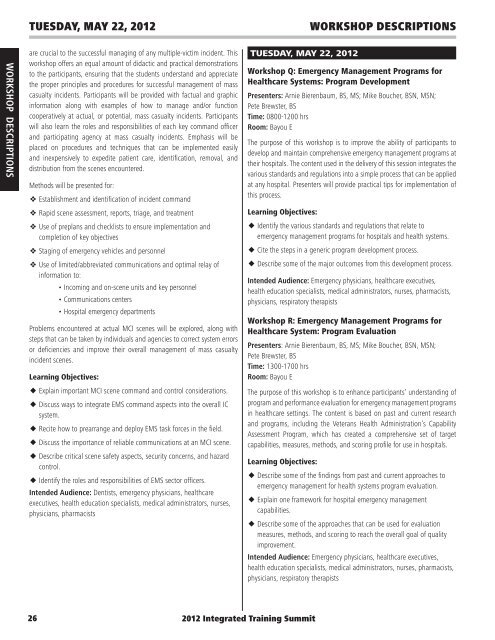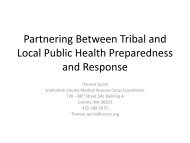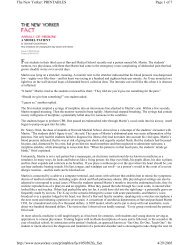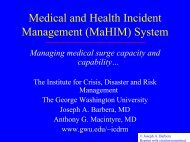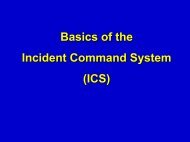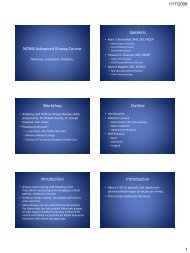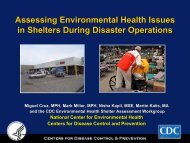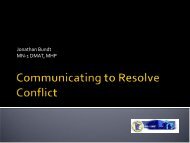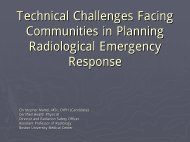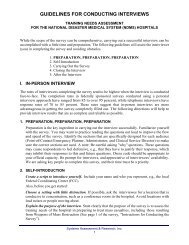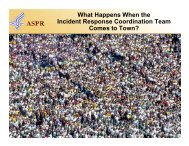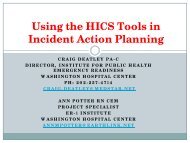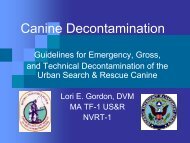Tuesday, May 22, <strong>2012</strong>Workshop DescriptionsWorkshop Descriptionsare crucial to the successful managing of any multiple-victim incident. Thisworkshop offers an equal amount of didactic and practical demonstrationsto the participants, ensuring that the students understand and appreciatethe proper principles and procedures for successful management of masscasualty incidents. Participants will be provided with factual and graphicinformation along with examples of how to manage and/or functioncooperatively at actual, or potential, mass casualty incidents. Participantswill also learn the roles and responsibilities of each key command officerand participating agency at mass casualty incidents. Emphasis will beplaced on procedures and techniques that can be implemented easilyand inexpensively to expedite patient care, identification, removal, anddistribution <strong>from</strong> the scenes encountered.Methods will be presented for:❖ Establishment and identification of incident command❖ Rapid scene assessment, reports, triage, and treatment❖ Use of preplans and checklists to ensure implementation andcompletion of key objectives❖ Staging of emergency vehicles and personnel❖ Use of limited/abbreviated communications and optimal relay ofinformation to:• Incoming and on-scene units and key personnel• Communications centers• Hospital emergency departmentsProblems encountered at actual MCI scenes will be explored, along withsteps that can be taken by individuals and agencies to correct system errorsor deficiencies and improve their overall management of mass casualtyincident scenes.Learning Objectives:u Explain important MCI scene command and control considerations.u Discuss ways to integrate EMS command aspects into the overall ICsystem.u Recite how to prearrange and deploy EMS task forces in the field.u Discuss the importance of reliable communications at an MCI scene.u Describe critical scene safety aspects, security concerns, and hazardcontrol.u Identify the roles and responsibilities of EMS sector officers.Intended Audience: Dentists, emergency physicians, healthcareexecutives, health education specialists, medical administrators, nurses,physicians, pharmacistsTuesday, May 22, <strong>2012</strong>Workshop Q: Emergency Management Programs forHealthcare Systems: Program DevelopmentPresenters: Arnie Bierenbaum, BS, MS; Mike Boucher, BSN, MSN;Pete Brewster, BSTime: 0800-1200 hrsRoom: Bayou E<strong>The</strong> purpose of this workshop is to improve the ability of participants todevelop and maintain comprehensive emergency management programs attheir hospitals. <strong>The</strong> content used in the delivery of this session integrates thevarious standards and regulations into a simple process that can be appliedat any hospital. Presenters will provide practical tips for implementation ofthis process.Learning Objectives:u Identify the various standards and regulations that relate toemergency management programs for hospitals and health systems.u Cite the steps in a generic program development process.u Describe some of the major outcomes <strong>from</strong> this development process.Intended Audience: Emergency physicians, healthcare executives,health education specialists, medical administrators, nurses, pharmacists,physicians, respiratory therapistsWorkshop R: Emergency Management Programs forHealthcare System: Program EvaluationPresenters: Arnie Bierenbaum, BS, MS; Mike Boucher, BSN, MSN;Pete Brewster, BSTime: 1300-1700 hrsRoom: Bayou E<strong>The</strong> purpose of this workshop is to enhance participants’ understanding ofprogram and performance evaluation for emergency management programsin healthcare settings. <strong>The</strong> content is based on past and current researchand programs, including the Veterans Health Administration’s CapabilityAssessment Program, which has created a comprehensive set of targetcapabilities, measures, methods, and scoring profile for use in hospitals.Learning Objectives:u Describe some of the findings <strong>from</strong> past and current approaches toemergency management for health systems program evaluation.u Explain one framework for hospital emergency managementcapabilities.u Describe some of the approaches that can be used for evaluationmeasures, methods, and scoring to reach the overall goal of qualityimprovement.Intended Audience: Emergency physicians, healthcare executives,health education specialists, medical administrators, nurses, pharmacists,physicians, respiratory therapists26<strong>2012</strong> Integrated Training Summit
Tuesday, May 22, <strong>2012</strong>Workshop DescriptionsWorkshop S: Advanced Airway Management inAustere ConditionsPresenters: Leon Dent, MD, MS; Howard Klausner, MD, BSE IOE, FACEP;Marc S. Rosenthal, PhD, DO, FACEPTime: 0800-1200 hrsRoom: Canal BMost patients presenting to an emergency department or a DMAT medicalstation do not require advanced or even simple airway managementtechniques. However, a significant number of patients could require airwayintervention, and for about 5 percent of these patients, based on emergencydepartment experience, advanced airway techniques will be needed tosecure an airway. Unfortunately, while most emergency physicians haveexperience in advanced airway intervention, most family practioners,internists, and others do not have this experience. Should a presentingpatient require advanced airway intervention that cannot be provided, thepatient will most likely die. This end point can potentially be preventedby training DMAT physicians in advanced airway techniques and havingthem practice these techniques in a safe environment. <strong>The</strong> objective of thisworkshop is to provide advanced methods to establish an airway in thedifficult patient. <strong>The</strong> course will cover most advanced airway options, even ifDMATs do not provide the equipment. This approach will further develop theprovider’s skills and improve their ability to establish an airway when theyhave limited resources. In addition, the participants will develop a betterknowledge base on airway anatomy, medications used for intubation, thevariety of approaches that can be used, and simple steps to determine if thepatient will have a difficult airway. With the pathophysiology presented andthe clinical skills taught, participants should improve their ability to establishan airway in a difficult patient with equipment at hand. <strong>The</strong> participantswill develop improved skills for obtaining and securing airways usingadvanced intubation and airway management techniques. <strong>The</strong> participantswill practice these skills during the workshop. Participants will developfurther understanding of difficult airway issues and develop better methodsto determine if a patient will require advanced airway techniques prior toestablishing a secure airway. Finally, the participants will be encouraged tothink outside the box to develop other techniques to establish an airway aswell as to maintain adequate oxygenation and ventilation in patients underaustere conditions.Learning Objectives:u Improve your skill set for emergency airway management.u Develop a better understanding of difficult airways and be able toanticipate a difficult airway.u Develop a better understanding of airway anatomy and currentequipment available to establish an airway.Intended Audience: Emergency physicians, EMT/paramedics, healtheducation specialists, nurses, physicians, respiratory therapistsWorkshop T: Using HSEEP Tools to Develop EffectiveHospital ExercisesPresenter: Mary Massey, BSN, MATime: 0800-1200 hrsRoom: Bayou BSee page 23 for workshop description and objectivesIntended Audience: Emergency physicians, EMT/paramedics,environmental health personnel, healthcare executives, health educationspecialists, industrial hygienists, medical administrators, nurses,pharmacists, physicians, respiratory therapistsWorkshop U: Psychological First Aid (PFA)Presenters: Merritt Schreiber, PhD; Sandra Stark Shields, LMFT,ATR-BC,CTSTime: 0800-1200 hrsRoom: Bayou CThis workshop will present the American Red Cross workshop PsychologicalFirst Aid: Helping Others in Times of Stress. This workshop consists of fiveseparate segments and a series of tabletop exercises and practical tips forproviding basic psychological first aid by non-mental-health providers topatients and team members. <strong>The</strong> workshop provides a framework for practicalunderstanding of the factors that affect stress responses in disaster reliefworkers and the disaster patients they serve. In addition, it provides practicalsuggestions about what you can say and do as you practice the principlesof psychological first aid in real-world disaster settings with culturallydiverse populations. <strong>The</strong> purpose of this workshop is to prepare all nonmental-healthresponders and American Red Cross workers in a common,interoperable model of psychological first aid to provide basic care, comfort,and support to people who are experiencing disaster-related stress.Learning Objectives:u Describe how to recognize the signs of stress in clients, coworkers,and yourself.u Apply psychological first aid principles to provide immediate supportto people who may be experiencing stress.u Describe how to obtain additional mental health support for yourself,coworkers, and disaster victims or clients.Intended Audience: Dentists, emergency physicians, EMT/paramedics,environmental health personnel, healthcare executives, health educationspecialists, industrial hygienists, medical administrators, morticians, nurses,pharmacists, physicians, respiratory therapists, veterinarians<strong>2012</strong> Integrated Training Summit 27Workshop Descriptions
- Page 1 and 2: Leading from PreparednessThrough Re
- Page 3 and 4: Table of ContentsAmericans with Dis
- Page 5 and 6: Integrated Training Summit Partner
- Page 7 and 8: Focus area DescriptionsFocus Area D
- Page 9 and 10: Late Breakers & Early RisersTuesday
- Page 11 and 12: Handy Perforated Daily Agendas - De
- Page 13 and 14: Handy Perforated Daily Agendas - De
- Page 15 and 16: Handy Perforated Daily Agendas - De
- Page 17 and 18: Handy Perforated Daily Agendas - De
- Page 19 and 20: WorkshopDescriptions2012 Integrated
- Page 21 and 22: Monday, May 21, 2012Workshop Descri
- Page 23 and 24: MoNday, May 21, 2012Workshop Descri
- Page 25: MoNday, May 21, 2012Workshop Descri
- Page 29 and 30: WEDNESday, May 23, 2012dMIS Worksho
- Page 31 and 32: ThurSday, May 23, 2012dMIS Workshop
- Page 33 and 34: SessionDescriptionssession Descript
- Page 35 and 36: wednesday, May 23, 2012Session Desc
- Page 37 and 38: wednesday, May 23, 2012Session Desc
- Page 39 and 40: wednesday, May 23, 2012u Provide ex
- Page 41 and 42: wednesday, May 23, 2012Session Desc
- Page 43 and 44: wednesday, May 23, 2012Session Desc
- Page 45 and 46: Thursday, May 24, 2012Session Descr
- Page 47 and 48: THURsday, May 24, 2012Session Descr
- Page 49 and 50: THURsday, May 24, 2012Session Descr
- Page 51 and 52: THURsday, May 24, 2012Session Descr
- Page 53 and 54: THURsday, May 24, 2012Session Descr
- Page 55 and 56: THURsday, May 24, 2012Session Descr
- Page 57 and 58: FRIday, May 25, 2012Session Descrip
- Page 59 and 60: Tuesday, May 22, 2012MRC WorkshopsM
- Page 61 and 62: Tuesday, May 22, 2012MRC WorkshopsL
- Page 63 and 64: Continuing Education InformationCon
- Page 65 and 66: Continuing Education InformationSes
- Page 67 and 68: Planning CommitteeDawn AnastasiaChe
- Page 69 and 70: PresentersBrian Abrahamson, BAGaylo
- Page 71 and 72: PresentersMary Massey, BSN, MA, MEP
- Page 73 and 74: Presenter DisclosuresAlliance betwe
- Page 75 and 76: 2012 Poster PresentationsMRCPoster
- Page 77 and 78:
2012 Poster PresentationsApplicatio
- Page 79 and 80:
2012 Poster PresentationsCollaborat
- Page 81 and 82:
2012 Poster PresentationsEducation
- Page 83 and 84:
2012 Poster PresentationsSpecial Co
- Page 85 and 86:
Integrated Training Summit Acronym


